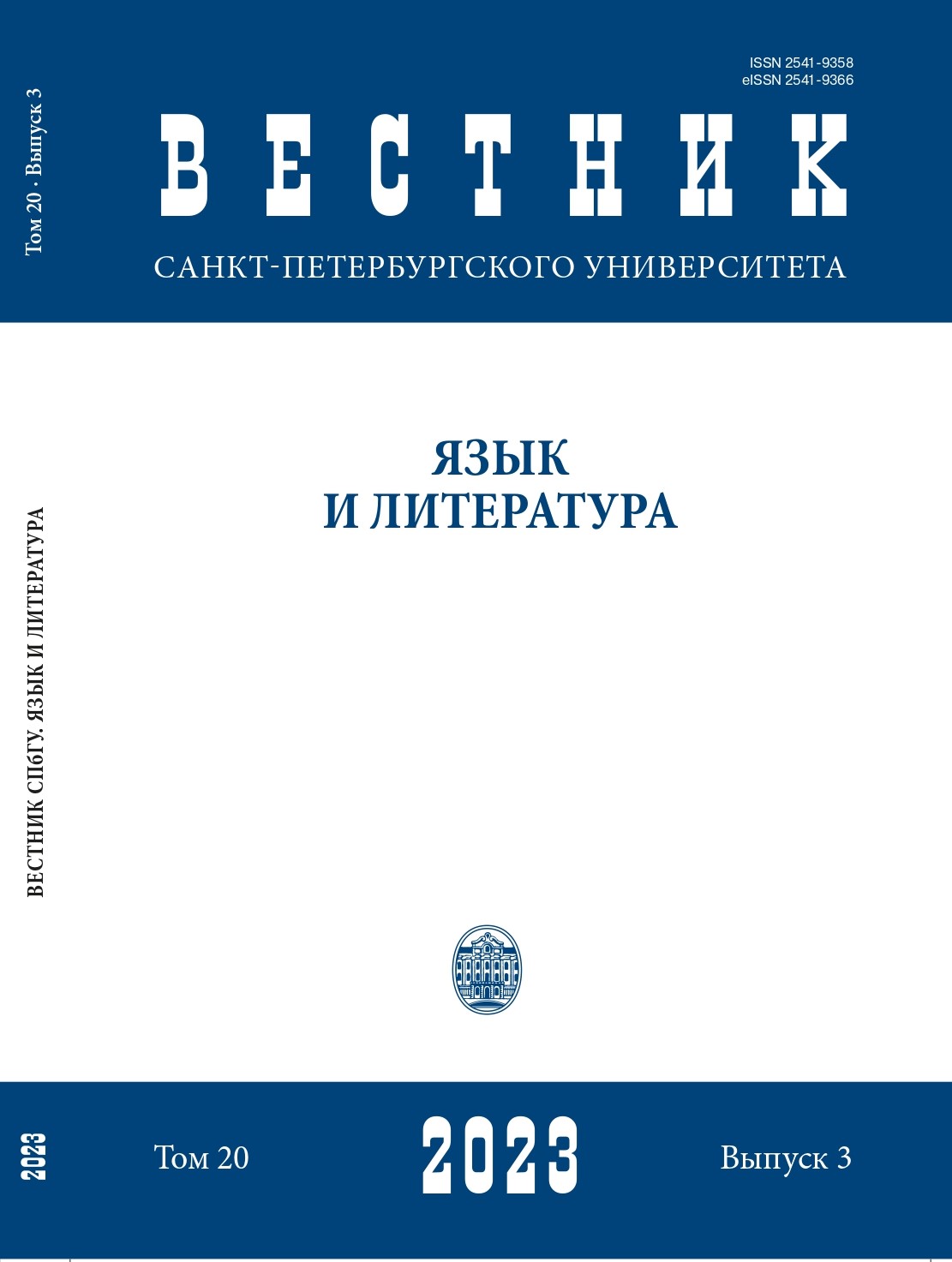The spa narrative of long 19th century Europe as map and network
DOI:
https://doi.org/10.21638/spbu09.2023.315Abstract
The resort network of modern Europe developed over the course of the 18th and 19th centuries. Emerging at different times (first in Great Britain, then in France, then in Germany and Russia), all national spa centers in one way or another reproduce a single, taken from the Roman tradition of the term (as a result of direct “inheritance” or — as in Russia — through a foreign national settler) type of organization of living space. Being subordinated to the “dual purpose of curing and entertaining the sick” (Guy de Maupassant), this space turns out to be correlated with the idea of an “other” (different from normative-socialized) life. Separate segments of this single European network space of codified deviancy, linked typologically and genetically, can in turn be represented as bundles of various socio-cultural connections arising around specific spa “characters” (as an example — the literary and writing network of Baden-Baden resort). Finally, another type of connections correlated with the European spa environment is its literary representations, the 19th century European spa narrative, the main features and agents of which are discussed in the article, using Mikhail Bakhtin’s category of genre memory and with the help of the SNA method. The research allowed to separate out two important clusters within the European fictional spa narrative, firstly the lineage of Tobias Smollett and secondly the lineage of Walter Scott. Finally, it is demonstrated how both lines come together outside the 19th century in the work of W.G. Sebald.
Keywords:
literary spa narrative, genre memory, social network analysis, distant reading, literary mapping
Downloads
References
References
Altshuller 1992 — Altshuller M.G.: “Kniazhna Meri” by Lermontov and “Saint Ronan’s Well” by Walter Scott. In: Michail Lermontov: 1814–1989. Norvičskij simpozium. Vermont: Norfield, 1992. P. 147–154. (In Russian)
Arinštejn 1979 — Arinštejn L. Acquaintance of Pushkin with the sister of the player des eaux de Ronan. In: Vremennik pushkinskoi komissii. Leningrad: Nauka Publ., 1979. P. 109–120. (In Russian)
Bakhtin 1972 — Bakhtin M. Problems of Dostoevsky’s Poetics. Moscow: Sovetskaia Rossiia Publ., 1972. (In Russian)
Bakhtin 1986 — Bakhtin M. The Bildungsroman and Its Significance in the History of Realism (Toward a Historical Typology of the Novel). In: Bakhtin M. Speech Genres and Other Late Essays. Austin: University of Texas Press, 1986.
Barthes 1977 — Barthes R. Textual Analysis of a Tale by Edgar Poe. Poe Studies, 1977, 10 (1): 1–12. https://www.eapoe.org/pstudies/ps1970/p1977101.htm (accessed: 12.01.2023).
Barthes 1991 — Barthes R. Mythologies. New York: Noonday Press; Farrar, Strauss & Giroux, 1991.
Borowka-Clausberg 2012 — Borowka-Clausberg B. An den Quellen des Hochgefühls: Kurorte in der Weltliteratur. Europäische Kurstädte und Modebäder des 19. Jahrhunderts. European health resorts and fashionable spas of the 19th century. Eidloth V. (ed.). Heidelberg; Theiss; Stuttgart: Heidelberg University Library, 2012. P. 217–230.
Curtius 1993 — Curtius E.R. Europäische Literatur und lateinisches Mittelalter, Tübingen; Basel: Francke Verlag, 1993.
Eidloth 2012 — Eidloth V. Kleine historische Geographie europäischer Kurstädte und Badeorte im 19. Jahrhundert. Europäische Kurstädte und Modebäder des 19. Jahrhunderts. European health resorts and fashionable spas of the 19th century. Eidloth V. (ed.). Heidelberg; Theiss; Stuttgart: Heidelberg University Library, 2012. P. 15–39.
Foucault 1986 — Foucault M. Of Other Spaces. Diacritics. 1986, 16 (1): 22–27.
Fuhs 1992 — Fuhs B. Mondäne Orte einer vornehmen Gesellschaft. Kultur und Geschichte der Kurstädte 1700–1900. Hildesheim; Zürich; New York: Georg Olms Verlag, 1992.
Izmailov 1928 — Izmailov N. “Romance on the Caucasian Waters”: Pushkin’s unfulfilled plan. In: Pushkin i ego sovremenniki: Materialy i issledovaniia. Leningrad: Nauka Publ., 1928. P. 96–99. (In Russian)
Kitanina 2009 — Kitanina T.A. Two notes on Pushkin and the “Caucasian text”. Pushkin i ego sovremenniki. Sbornik nauchnych trudov. 2009, (44): 231–247. (In Russian)
Klapuri 2015 — Klapuri T. Chronotopes of Modernity in Chekhov. Turku: Painosalama Oy, 2015.
Köhler 2015 — Köhler A. Pyrmont von verschiedenen Seiten betretend: Zum literarischen Umgang mit der Heterotopie Badeort um 1800. Publications of the English Goethe Society. 2015, 84 (1): 48–62
Kulishkina, Polubojarinova 2016 — Kulishkina O, Polubojarinova L. “In dem kleinen Karpatenbade”: Venus im Pelz als (trans)kulturelle Ikone Ostmitteleuropas. World Literature Studies. 2016, 8 (4): 5–18.
Kulishkina, Polubojarinova 2019 — Kulishkina O., Polubojarinova L.Dr. S.ʼs Badereisen: Der Kurorttopos in W.G. Sebalds Werk. Orbis Litterarum. 2019, (74): 340–364.
Lotz-Heumann 2022 — Lotz-Heumann U. The German Spa in the Long Eighteenth Century: A Cultural History. London; New York: Routledge, 2022.
Mazzoni 2017 — Mazzoni G. The Theory of the Novel. Harvard: Harvard University Press, 2017.
Moretti 1998 — Moretti F. Atlas of the European Novel. London; New York: Verso, 1998.
Moretti 2005 — Moretti F. Graphs, Maps, Trees. Abstract Models for a Literary History. London; New York: Verso, 2005.
Newman 2018 — Newman M. Networks. 2nd ed. Oxford: Oxford University Press, 2018.
Noak 2011 — Noak Ch. ‘Andere Räume’ — Sowjetische Kurorte als Heterotopien. Das Beispiel Sotschi’. In: Mastering Russian Spaces. Raum und Raumbewältigung als Probleme der Russischen Geschichte. Schlögel K.(ed.). München: Oldenbourg, 2011. P. 187–198.
Schmidt 2014 — Schmidt H. Martialische Wasser: der Kurort als Topos (post)kolonialer Expansion und
Imagination im Mittel- und Osteuropa. Kurort als Tat- und Zufluchtsort: konkurrierende Erinnerungen im mittel- und osteuropäischen Raum im 19. und 20. Jahrhundert. Kurilo O. (ed.). Berlin: Avinus Verlag, 2014. P. 141–166.
Shestakova 2015 — Shestakova E. Heterotopies of the city-dacha-resort in the world of I.A.Bunin. https://www.ceeol.com/search/article-detail?id=597790 (accessed: 12.01.2023). (In Russian)
Shields 1991 — Shields R. Places on the Margin: Alternative Geographies of Modernity. London: Routledge, 1991.
Downloads
Published
How to Cite
Issue
Section
License
Articles of "Vestnik of Saint Petersburg University. Language and Literature" are open access distributed under the terms of the License Agreement with Saint Petersburg State University, which permits to the authors unrestricted distribution and self-archiving free of charge.






